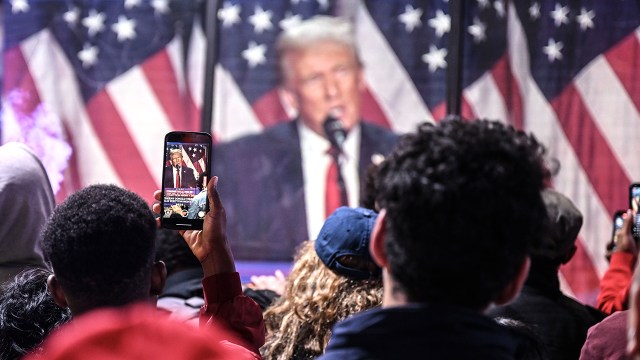
With Donald Trump’s decisive victory in the Nov. 5 presidential election, he is poised to make sweeping policy changes at home and abroad. What do the voters in Trump’s coalition want? How do they view the country and its challenges? Here’s what we know from Pew Research Center’s preelection surveys over the past year.
Supporters saw Trump as a change candidate. In an October survey, most of his supporters (86%) said he would change Washington for the better, while only 12% said he wouldn’t change things much. Supporters of Kamala Harris saw Trump as likely to change things, too, but 92% said he would change things for the worse.
This Pew Research Center analysis focuses on the perceptions and attitudes of Donald Trump’s supporters in the months leading up to his election on Nov. 5. All of the data in this analysis comes from Center surveys conducted over the course of 2024 presidential campaign. Links to these reports, including details about the survey methodology, are available in the text.
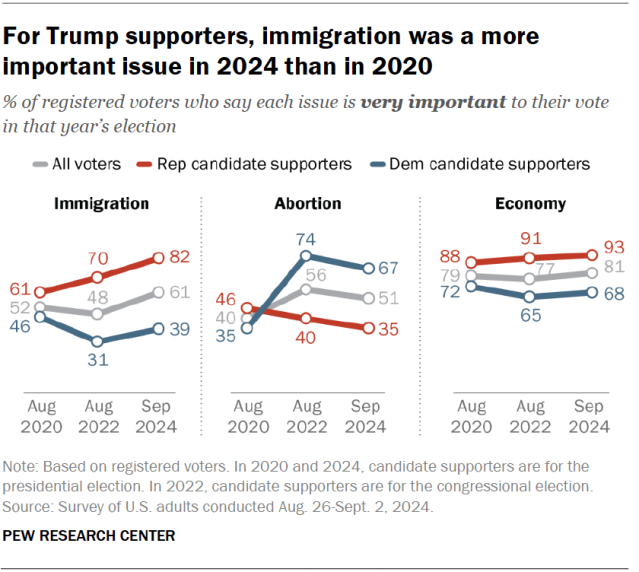
The economy and immigration were top issues for Trump supporters. Just as it was in 2020, the economy was the most important issue for Trump voters this year. In a September survey, 93% said it was very important to their vote.
Immigration ranked second, as 82% said it was very important to their vote. This was a substantial increase from 2020, when 61% of Trump supporters rated it as very important to them.
Issues that were much less important to Trump voters included climate change (11% said it was very important), racial and ethnic inequality (18%), and abortion (35%).
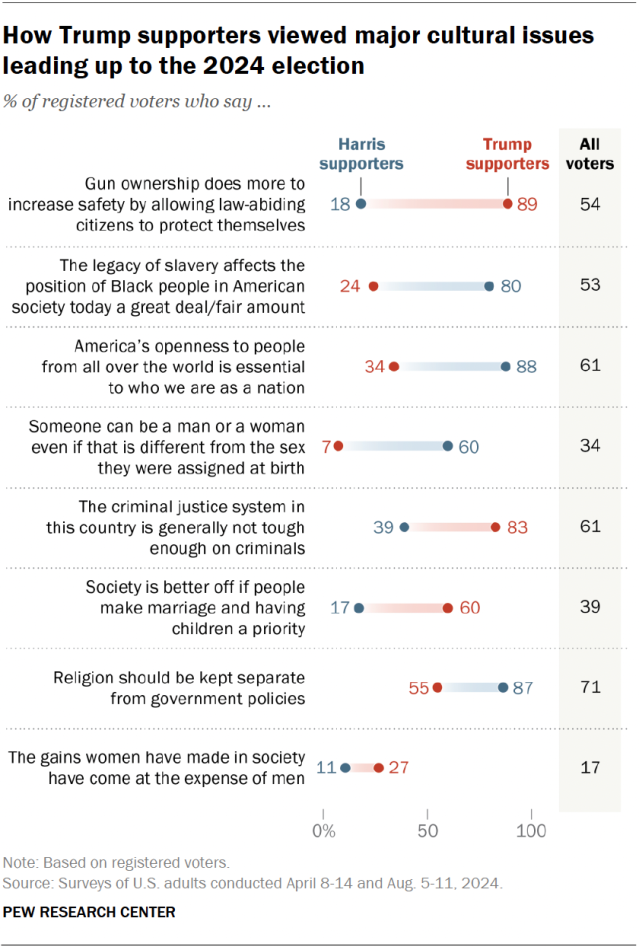
Trump supporters were unified on several cultural issues in polling conducted over the course of the year. Among those that they generally agreed on:
- 92% believed that biological sex is not mutable. Just 7% said a person can be a man or woman even if that is different from the sex they were assigned at birth.
- 89% said gun ownership does more to increase than decrease safety.
- 83% viewed the criminal justice system as not tough enough on criminals.
- 75% did not think the legacy of slavery affects the position of Black people in American society today much or at all.
On each of these issues, majorities of Harris supporters expressed opposing views.
There were two areas where Trump backers’ positions might challenge conventional wisdom:
- Asked whether the gains women have made in society have come at the expense of men, most (71%) said no.
- And just over half – 55% – said religion should be kept separate from government policies, although that is roughly 30 percentage points lower than the share of Harris supporters who said the same.
Trump supporters wanted a smaller government but no changes to Social Security. Republicans and Democrats have long differed over the size and scope of government, and that continued in this election cycle. For example, 72% of Trump supporters said aid to the poor does more harm than good. Only 18% of Harris backers said the same.
However, large majorities of Trump (77%) and Harris supporters (83%) opposed any reductions in the Social Security program.
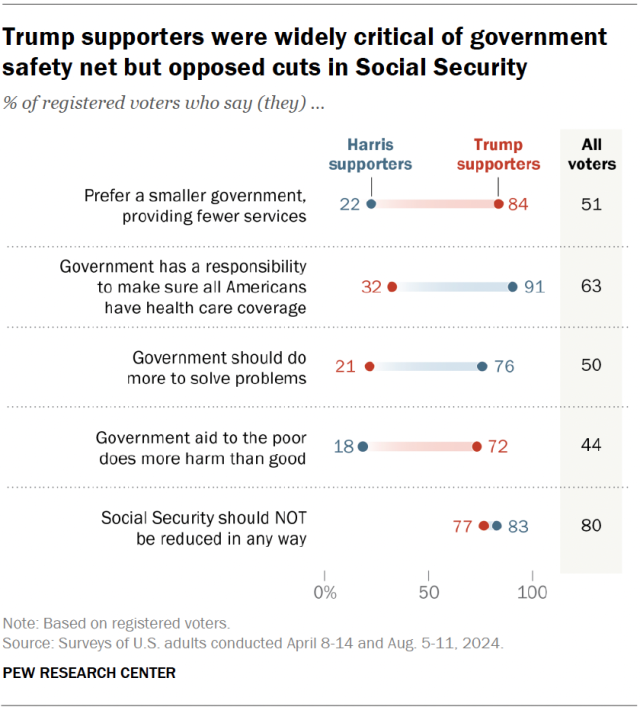
Trump supporters had especially negative views of national conditions. A month before the election, only 5% of Trump supporters said they were satisfied with the way things were going in the country. And in September, roughly nine-in-ten (89%) said they were very concerned about the price of food and consumer goods.
Harris supporters were also broadly dissatisfied, but less so. Four-in-ten were satisfied with the way things were going, and 62% were very concerned about prices.
Economic pessimism was evident in many countries this year. As in the U.S., negative assessments of the economy were typically much higher among members of the party not in power than among supporters of the party in control of government.
Trump supporters felt they understood his policy positions ahead of the election. In October, more than nine-in-ten Trump supporters (94%) said he had clearly explained his policies for addressing illegal immigration. Large majorities said the same about his policies on the economy and foreign policy. The one topic that lagged a bit was health care: 58% said they knew what he would do if he won the race.
Trump supporters saw Harris’ positions on several issues, including immigration and the economy, as less clear than Trump’s.
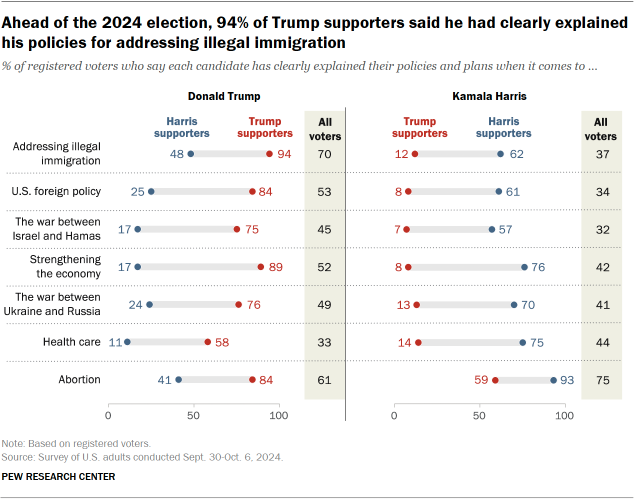
What’s acceptable – and unacceptable – on day one? What do Trump’s supporters think of some of the more unprecedented steps he has suggested he may take in his early days in office? In the September survey:
- 58% of Trump supporters said it would be definitely or probably acceptable for him to use executive orders to make policies if he can’t get his priorities through Congress.
- 54% said it would be acceptable for him to order federal law enforcement officials to investigate his Democratic political opponents.
- At the same time, 58% said it would be unacceptable for him to fire government workers for not being loyal to him.
- 57% said it would be unacceptable for him to pardon friends or supporters who have been convicted of a crime.
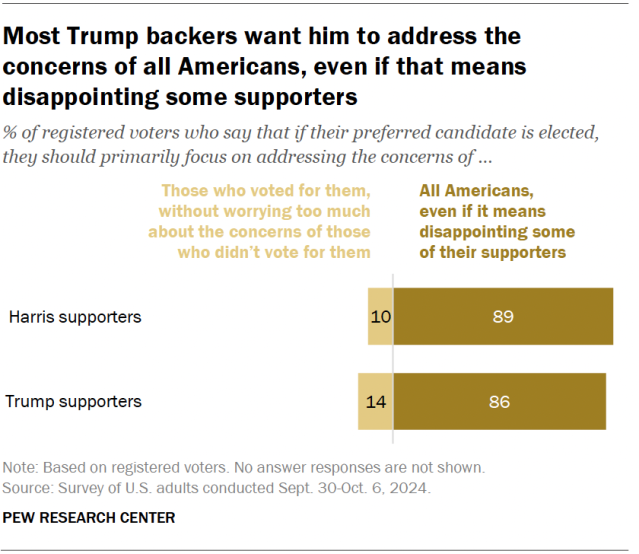
Is there an olive branch? In October, 86% of Trump supporters said he should focus on addressing the concerns of all Americans, not just his supporters, if he were elected – even if that meant disappointing some of those who had backed him.
In September, seven-in-ten Trump supporters said the next president should work with the opposing party in Congress. In October, an identical share of Trump backers saw this as very or somewhat likely if Trump won, though just 19% said it would be very likely.




